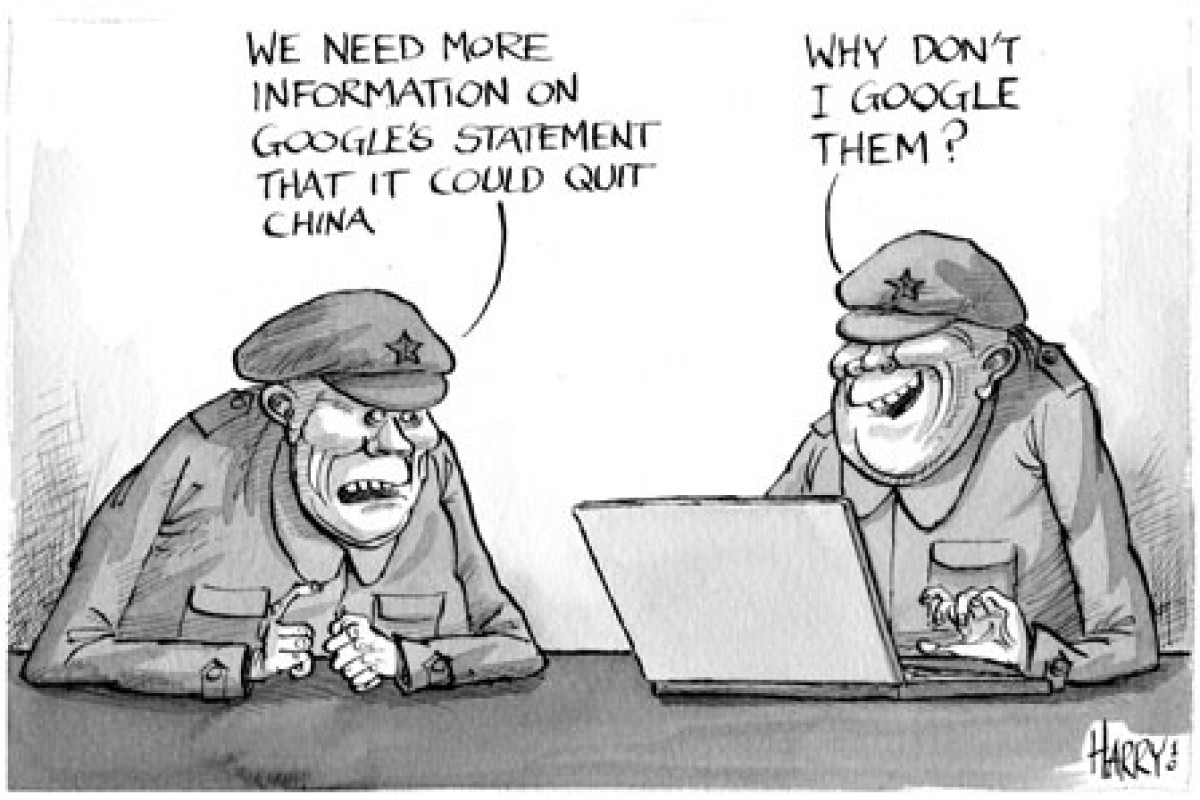
 iii
iiiDownload this worksheet and analyse the cartoon
Discuss
‧ Do you think internet should remain censored on the mainland?
‧ What topics could be problematic if they were freely discussed on the mainland?
‧ Google has become so important that it is involved in politics. Can you think of another similar situation where a company had some weight in political decisions?
Refers to:
Unfiltered Google unlikely to last
By Staff Reporters in Beijing and Reuters in San Francisco
Tanks in Tiananmen? Check. Uncensored news of the Dalai Lama and Falun Gong? Check. Google.cn put on a new face in China yesterday, but it's one that even Google admits could disappear soon if, as expected, Beijing shows no stomach for unfiltered information on the internet.
The government had no official response yesterday to Google's announcement its Chinese-language mainland search engine would no longer adhere to increasingly strict censorship requirements. Analysts, though, are in no doubt the US Web search giant will leave the mainland market, leaving Beijing to maintain its stranglehold on cyberspace. They said the government was unlikely to ease the curbs on free speech that are essential to maintaining one-party rule.
Mainland authorities were "seeking more information on Google's statement", Xinhua reported last night, citing an unnamed official from the State Council Information Office, one of the main bodies responsible for censoring the Web.
Investors had no doubt about the impact on Google's business of withdrawal from the world's most populous country. Its shares were trading 1.4 per cent lower on the Nasdaq market in New York at noon.
The announcement by the California-based internet giant came with tensions rising between China and the United States over internet freedoms. Secretary of State Hillary Rodham Clinton is set to announce a technology policy next week to help citizens in other countries gain access to an uncensored Web. The US yesterday demanded an explanation of hacking attacks described in a Google statement on Tuesday.
"It may be bad news for internet users on the mainland, but it is business as usual or even great news for the government, which will benefit the most from the retreat of a daring critic," said Xu Youyu, a professor at the Chinese Academy of Social Sciences.
Despite the possible public relations fallout, Xu and Liu Deyou, an internet law professor, said the government was becoming increasingly assertive and unyielding in the face of international criticism on issues ranging from human rights to carbon emissions.
Liu, from the Beijing University of Posts and Telecommunications, said he was very pessimistic about the future of Google on the mainland. "There is no turning back for Google ... the die is cast. It is highly unlikely that the government will sit down and talk with Google over a deal because such a compromise would be viewed as face-losing and amounting to a public acknowledgment that its internet control is wrong," he said. Liu said Beijing would not bow to pressure partly because of its fears that other international internet companies might follow Google's example and demand more freedom.
Still, he said Beijing was unlikely to take punitive steps against Google, such as blocking the company's global search engine, Google.com, as some have speculated. "It would only make the already embarrassed government look even more stupid," he said.
In a statement posted on the company's blog, which is blocked in the mainland, Google said it had uncovered a sophisticated attack on the e-mail accounts of Chinese human rights activists using its Gmail service and that more than 20 other companies were attacked in similar fashion.
Reuters reported that the attack on Google originated from China and appeared also to have targeted Adobe Systems - a leading multimedia and document software company. The attackers had exploited security vulnerabilities in the popular Adobe Acrobat and Adobe Reader software, possibly to steal proprietary codes.
Adobe, which released a critical patch for this problem on Tuesday, was not immediately available for comment.
"These attacks and the surveillance they have uncovered - combined with the attempts over the past year to further limit free speech on the Web - have led us to conclude that we should review the feasibility of our business operations in China," said Google's chief legal officer, David Drummond. "We recognise that this may well mean having to shut down Google.cn, and potentially our offices in China."
The company refrained from accusing the mainland government of sponsoring the cyber attacks or specifying the scope of the hacking or the hackers' identities. But it said cyber attacks "originating from China" had been detected regularly since mid-December.
Although this is not the first time Google has been at odds with the government since Google.cn's launch in 2006, its statement is its fiercest attack yet on Beijing's sweeping internet filtering system. The company has come under fire for its arrangement with the authorities to purge the results of searches on sensitive topics.
Google's statement does not necessarily mean it will abandon China. It could follow the lead of other US internet companies that have chosen to partner with local companies instead of maintaining their own sites, said Sandeep Aggarwal, analyst at Collins Stewart.
Google said it would try to negotiate with the government in the next few weeks over a new arrangement to provide uncensored results on Google.cn, but few analysts believe that will happen.
Xu Youyu said Google's withdrawal would be another blow to free communications between China and the outside world.
"It will be inconvenient if Google quits China, but it won't make a huge difference to our daily lives, which are already under intense government surveillance and control," he said.